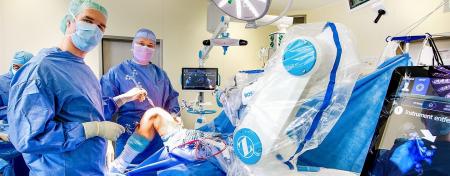Top destination for prevention, diagnostics and therapy
Berlin is also the medical capital of Germany. No other city offers a comparable variety of hospitals and medical practices with such a broad range of healthcare services. Nowhere else do medical technology and biotech firms work so closely together with clinical partners, and nowhere else can a similar breadth of medical science and research be found.
In addition, the different medical facilities work closely together, which means that a patient who requires specialised treatment that is only available at a particular hospital will be transferred if necessary. International patients benefit from this collaboration and can fully rely on the expertise in the medical treatment chain, be it in a diagnostic centre, a university hospital or a rehabilitation clinic. For this reason, more and more people from all over the world are coming to Berlin for prevention, diagnostics or therapy.










